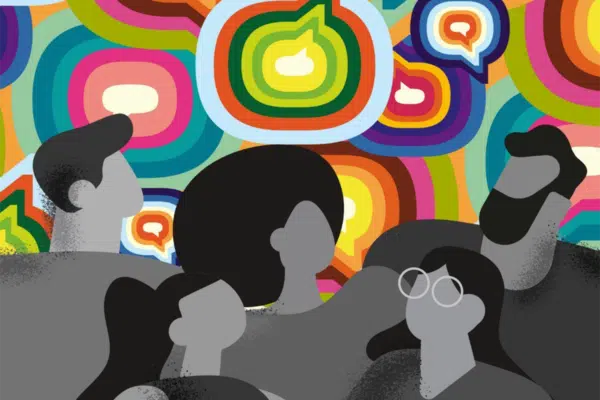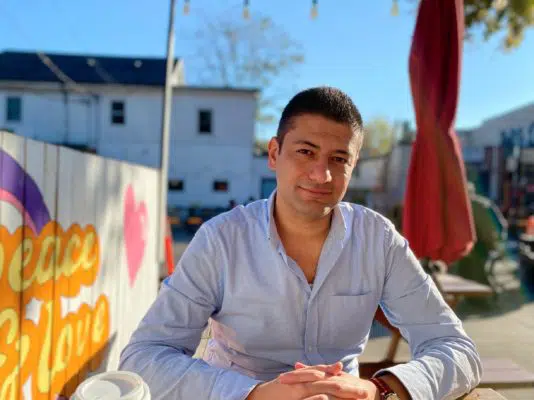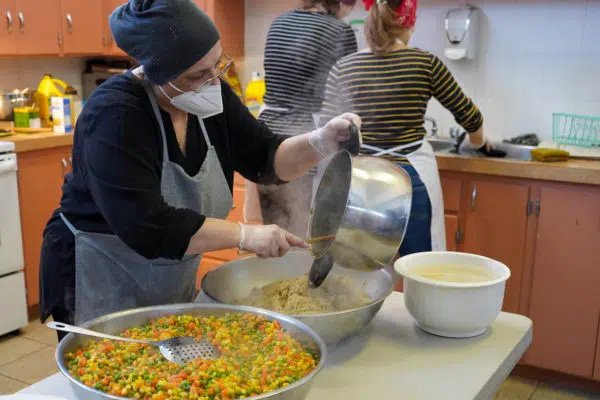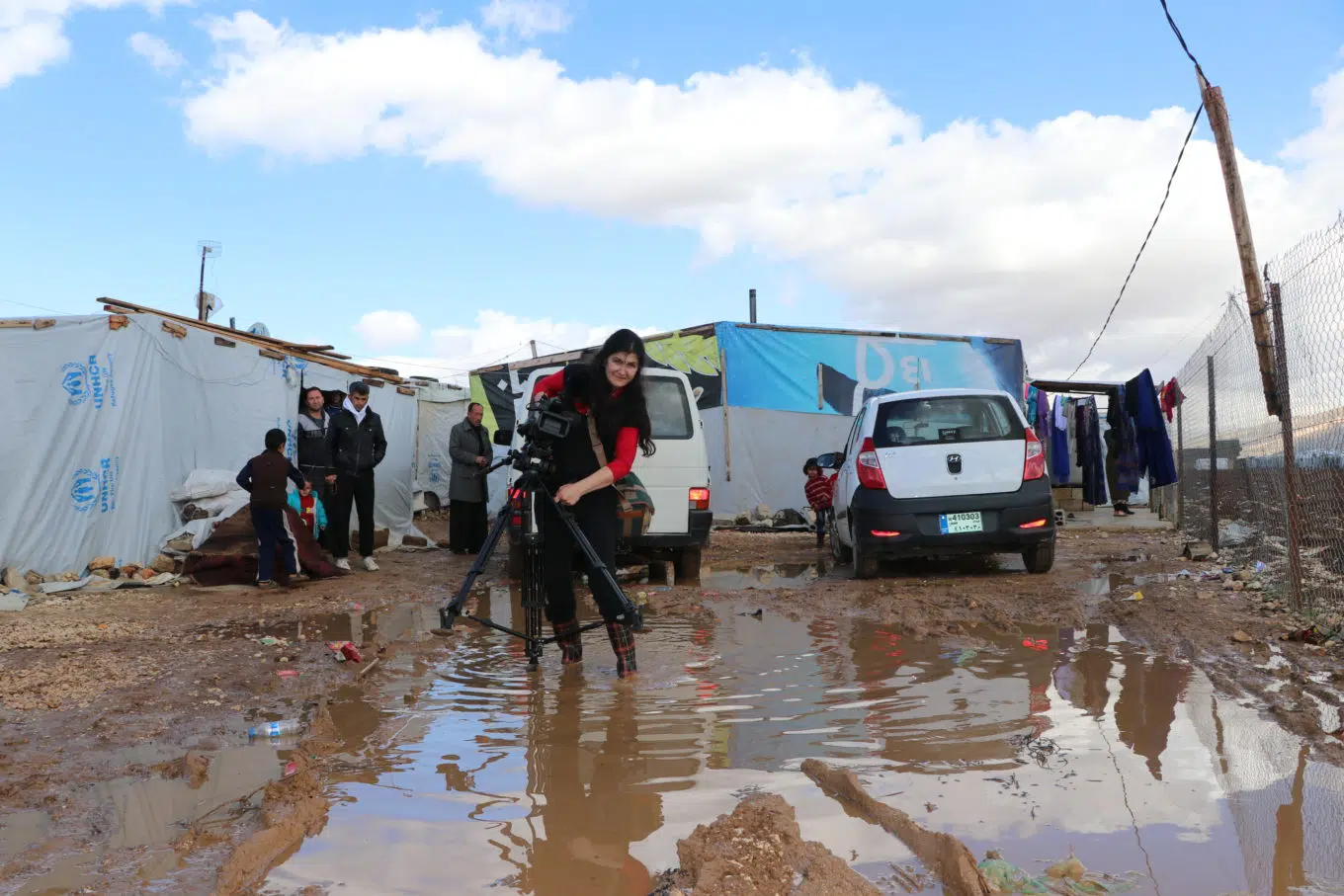
Noura Kevorkian on set during the filming of Batata. © Photo courtesy of Noura Kevorkian
Canadian filmmaker chronicles the life of a Syrian refugee family in Lebanon
By Levon Sevunts
The UN Refugee Agency, UNHCR, is partnering with Hot Docs Canadian International Documentary Festival this year to showcase refugee and migrant voices from around the world.
UNHCR’s partner program “Diaspora” presents eight films featuring stories of displacement and people starting their lives over, often under harrowing circumstances.
One of those films is “Batata,” a two-hour documentary by Toronto-based filmmaker Noura Kevorkian, chronicling the life and struggles of a Syrian potato farmer and her extended family of refugees in Lebanon over the course of a decade.
Syria remains the world’s largest displacement crisis. More than 13 million people have either fled the country or are displaced within its borders. More than one million Syrian refugees are in Lebanon, giving it the highest per capita proportion of refugees in the world, and placing enormous pressure on the country and its people.
UNHCR’s Levon Sevunts spoke with Noura Kevorkian about what attracted her to the story of Maria and her family of Syrian refugees in Lebanon’s Beqaa Valley.
The following is an excerpt of their conversation which has been edited for brevity and clarity.
Q: Noura, tell me about yourself, about your family background, where are you from? Where is your family from?
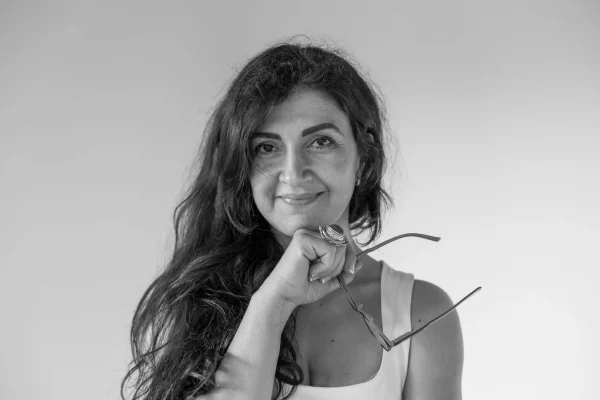
© Photo courtesy of Noura Kevorkian
A: I was born in the city of Aleppo, Syria. My mom is Syrian and my dad is Lebanese. My father was born in a refugee camp in Lebanon, in the Karantina refugee camp. So, I do come from a family of refugees because my ancestry is Armenian, and they had survived the Armenian genocide of 1915
I don’t remember Syria much because I was only a year old when my parents moved back to Lebanon, where my dad grew up.
Q: When did you leave Lebanon?
A: I had spent my life basically growing up in Beirut and then during the Lebanese Civil War, we moved to this really amazing Armenian village in Lebanon called Anjar. The village was founded by the survivors of the Armenian genocide from the area of Moussa Dagh [in Turkey]. We moved from Beirut to Anjar because it was safer to live in Anjar during the Lebanese Civil War.
I was around 17 when I finished high school and there was no future for any one of us. Everyone, every Lebanese, was leaving Lebanon because the war had really taken a toll on us. So, I basically ended up coming to Canada on my own and I went to high school here. The last two years of high school I did here in Canada, in Toronto. And then I went to university and the next thing you know, I stayed year after year and then I got married, I have kids and so, I’m here.
Q: When did you know that you wanted to make films?
A: Well, I always loved movies. I always wanted to tell stories. I grew up in a culture that emphasized storytelling. My mom is an amazing storyteller, she comes from a very rich oral tradition. And growing up in Lebanon, I went around the village in Anjar listening to the stories of the elders and discovering that they’re all genocide survivors. Through this, I found commonality between the older generation, the Armenian people, myself and my generation that was going through the civil war.
I would go and listen to stories because I knew that I wanted to grow up one day and be able to tell stories and make movies. Since I was living in a village during the civil war it was like a dream that felt impossible. Almost. I never imagined that I would actually ever be able to do that.
Q: How do you think your background, your upbringing, and your experiences growing up in Lebanon affect the kind of stories that you want to tell as a filmmaker?
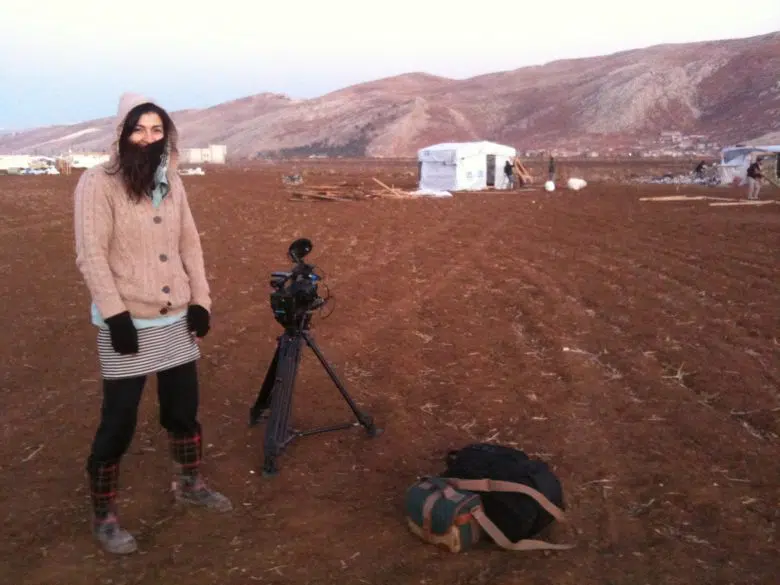
© Photo courtesy of Noura Kevorkian
A: Well, you know, I think we are all inspired by the culture, the families and the traditions we grew up with. So having come from the unjust historical events that happened to my family, I grew up with that. And then the civil war, all these experiences had a very big effect on me as a child.
I understand what injustice means. I have felt it on my skin.
I understand what it means to, you know, run down the stairs and go down to the bunkers and be terrified when the bombs are falling in Beirut.
I know what it feels like to be in a refugee camp, to be hungry and cold, and have no hopes because I’ve heard so many of these stories from my father and so many other Armenians that I’ve interviewed, from so many other Arabs, Palestinians and Syrians. I’m interested in these stories because I grew up in that culture.
Everything I’ve done is really about genocide, human rights, women’s issues and refugee issues. These are the subjects that interest me.
Q: You’ve also spent your formative years in Canada. How does that affect you as a filmmaker, as a storyteller, as a person who cares about certain issues?
A: Growing up in Lebanon, I was at a disadvantage as a girl because the separation of the sexes was very distinct. It’s a very patriarchal society: women don’t have as much voice, as much freedom. And so, in a way, I couldn’t wait to get out of there: one, to be able to start my future and work on some of my dreams.
And I realised how different I am from all the other women and girls that grew up with me. I have been exposed to so many different life experiences and with that privilege comes the responsibility to represent them, to tell their stories, to show injustice and inequality — so I took that responsibility seriously.
I’m very interested in telling stories of people who are marginalised, especially women. For example, in this film Batata, hundreds of thousands of people have driven on the Damascus highway, which is the name of the road that connects Damascus to Beirut. And they have looked and seen all these Syrian migrants working, right? We just drive by and see it, but for me, Maria is one of those migrants and she is a woman. I was so attracted to her strength and her ability to show how society treats her and the other women.
Q: Speaking of Batata, it’s premiering at the Hot Docs Festival. What do you want the people who come to see your film in person or virtually take away from it?
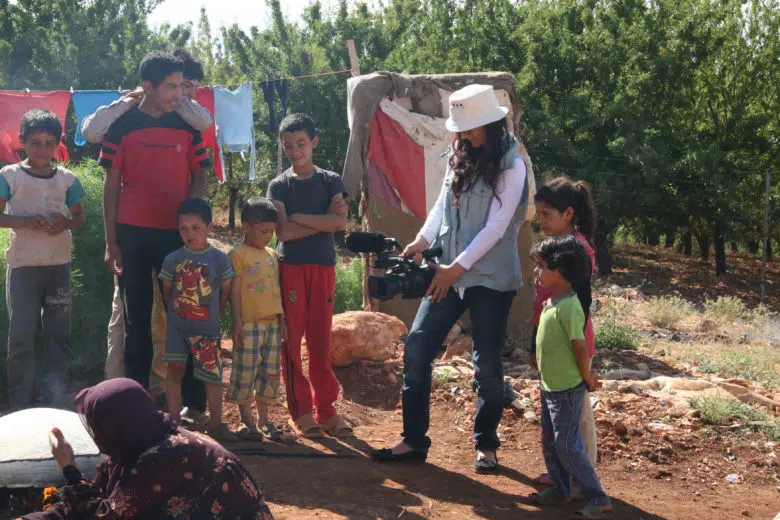
© Photo courtesy of Noura Kevorkian
A: I spent ten years filming this movie and two years editing it. So, it’s really a project of love. I didn’t go into making this film thinking I was going to spend 12 years of my life making a documentary. At first, I was making a film about Syrian potato farmers and their lives — by following this amazing woman named Maria, who’s charismatic and a leader in her community. I wanted to showcase her, her strength, and celebrate this woman. But then, of course, when the revolution and the Syrian war started, it changed into this huge story of Syrian refugees.
I decided to stay year after year, to go back and back again for ten years because I believed that this film was so important since I had access [to this camp].
I had a responsibility to share that access with the world, to show everyone what it really feels like to be a refugee.
To show what the everyday life of a refugee looks like so that people get to have that experience and have a chance to see real refugees living day in and day out in a refugee camp.
So that’s what I would like people to be able to take from this film when they go. I would like people to go see Batata and take part in the lives of all these people. And see how people are, like getting married, having babies, people dying, war happening. It’s really a glimpse into people’s lives over the course of a decade and I hope that at the end of the film, the audience will have a better understanding when we talk about refugees and their experiences. And I’m also hoping that they will be inspired to help refugees.
Hot Docs, North America’s largest documentary festival, is a not-for-profit organization dedicated to advancing and celebrating the art of documentary and to creating production opportunities for documentary filmmakers. Hot Docs will present its 29th annual edition from April 28 to May 8, 2022, in cinemas across Toronto, as well as online to audiences throughout Canada.
Noura Kevorkian is a Canadian filmmaker of Armenian, Lebanese and Syrian descent. She made her film debut with the award-winning short documentary “Veils Uncovered” (Official Competition Amsterdam IDFA, Golden Sheaf Yorkton), followed by the feature-length documentary “Anjar: Flowers, Goats and Heroes” and docudrama “23 Kilometres” (Official Competition Karlovy Vary). Inspired by her experiences during the filming of “Batata” over the last decade, Noura is writing her first dramatic screenplay about two teenagers who fall in love in a refugee camp.



